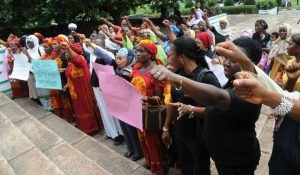 Leangei Gomez Nuñez
Leangei Gomez Nuñez
The PM News (Nigerian News) reported that a man named M.Y. murdered his wife on the 17th of November 2011 for refusing to have sex with him. He was sent to the prison by the Ilorian Magistrate Court [PM News, 2012]
One in every four women in Nigeria experience domestic violence at some point in their lives. Many have also undergone female genital mutilation, and eighty-eight percent of young girls have been married too young. All of this violence towards women can be accounted for by Nigerian patrilocal customs. Their customs dictate that women are subordinate to men and must do as their father and husbands command. According to Ifemeje, men expect obedience from their wives and have sexual rights to them. Husbands, therefore, can physically assault and rape their wives if they feel as if a wife is not fluffing her obligations to him. This is a major issue for these women as these forms of violence that they are been submitted to are not seem as a problem but rather normal.
Nigerian women also suffer from female genital mutilation. Female genital mutilation is practiced throughout the country, with the exception of one ethnic group. Different ethnic groups practice different forms of FGM with clitoridectomies being more common in the south and infibulation in the north. According to Okeke, the practice has been attributed to the preservation of chastity, family honor, and protection of promiscuity as well as the control of sexual attitudes.
Child marriage is another phenomenon that has deep roots in the Nigerian customs. The country has one of the highest rates in the world, with 88% of young girls being married before the age of 16. Families believe that by marrying their daughters they will be protected and supported. This, however, puts them as a higher risk to be physically, sexually, and psychologically abused by their partners.
Cultural views and lack of income are said to be the main factors contributing to violence against women. Most Nigerians live in systems of patrilineal kinship with wives moving to live with the families of their husbands after marriage. In this system, men have power and control over women and it is considered normal to physically punish wives if they are not following orders or behaving appropriately. Social customs also dictate that young wives must be initiated into sex often by force or rape. This sexual abuse continues throughout the marriage. Although these are clear forms of abuse, they are not view as problems or crimes because of cultural views regarding gender roles.
Income has also been noted to play a major part when it comes to domestic violence. According to Gage and Thomas, the loss of employment and of the breadwinner role have been noted as a stressor in marital relationships. Women who earn an income are at higher risk of being physically attacked by their husbands. This is because when women become the providers and are more economically independent, men may respond by using violence to keep hold of their hierarchy and compensate for the loss of the breadwinner role.
Although prevention and resolution of violence against women are harder to achieve because many times the acts are not reported, there are many campaigns that are fighting to put an end to these issues. The Nigerian government has implemented policies to out end to them. In 2015, the Violence Against Persons Prohibition act was adopted which prohibits female genital mutilation, harmful widowhood practices, harmful traditional practices and all forms of violence against persons in both private and public life. The state of Ekiti has stablished a Gender-Based Violence Fund to provide basic material support for victims; here they receive free shelter and vocational training. Lagos government has outline plants to establish a Fund to pay for free legal services to women and children suffering violence. Even with government there are still many challenges ahead both legally and culturally.
Leangei Gomez is a Senior at ECU majoring in Anthropology with a concentration in culture and a minor in history. She is graduating in May 2018, and hopes to join the Peace Corp in 2020 before applying for Grad School. Leangei hopes to work in bettering education systems in Latin America and the Caribbean.